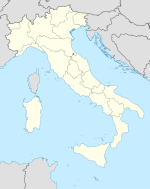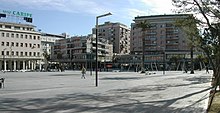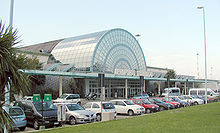Pescara
| Pescara | ||
|---|---|---|

|
|
|
| Country | Italy | |
| region | Abruzzo | |
| province | Pescara (PE) | |
| Coordinates | 42 ° 28 ' N , 14 ° 13' E | |
| height | 4 m slm | |
| surface | 33.6 km² | |
| Residents | 119,800 (Dec. 31, 2019) | |
| Population density | 3,565 inhabitants / km² | |
| Post Code | 65100 | |
| prefix | 085 | |
| ISTAT number | 068028 | |
| Popular name | Pescaresi | |
| Patron saint | San Cetteo | |
| Website | www.comune.pescara.it | |


Pescara [ pesˈkaːra ] is an Italian city in the Abruzzo region , 208 km east of Rome , with 119,800 inhabitants (as of December 31, 2019). It is the capital of the Province of Pescara .
geography
Pescara is located at the mouth of the Pescara River in the Adriatic Sea .
The neighboring communities are Chieti ( CH ), Francavilla al Mare (CH), Montesilvano , San Giovanni Teatino (CH) and Spoltore .
history
Pescara's origins go back to before its conquest by the Romans . The Vestines built the port of the same name called Aternum at the strategically favorable location in the area where the river Aternus (Pescara) flows into the Adriatic Sea . It was the only Vestin town on the seashore and an important trading center, which the Marrukines and Paeligners also used as an emporium . Veterans were settled here under Emperor Augustus and the city's territory was divided among them. Aternum was connected to Rome by the Via Claudia Valeria . The vicus was important as a port of passage to Salonae in Dalmatia . In 538 AD Aternum was conquered by the Eastern Roman army master Johannes .
Aternum was destroyed in 597 when the Lombards invaded . The Bishop of Amiternum , Cetteo , who later became the patron saint of Pescara, is said to have been executed by the Lombards in Amiternum by being thrown from a bridge with a heavy stone tied around his neck, whereupon his body was driven to Aternum.
In the High Middle Ages the city was re-established under the name Piscaria . It came into the possession of the Montecassino, as a wedding gift to the Greek wife Theophanu of Emperor Otto II and to the Normans . In 1137 Emperor Lothar advanced in his fight against King Roger II of Sicily via Pescara, which, like the other coastal cities, surrendered to him half willingly, half compelled. In 1209 Pescara was taken over by Emperor Otto IV and its castle destroyed. Emperor Friedrich II stayed here on March 15, 1226 and on March 22, 1240. King Conrad IV landed here at the beginning of January 1252 after a happy journey, and in July 1259 King Manfred set up camp near Pescara.
King Ladislaus of Naples rebuilt the old castle in 1409. In the 15th century, Pescara was at the center of the succession battles between the House of Anjou and the Aragonese and came under the rule of the d'Avalos . In 1435 and 1439 the city was conquered by the Italian condottier Jacopo Caldora . It then came into the possession of Emperor Charles V , who expanded it into a military facility in the first half of the 16th century. In 1566, 105 Turkish galleys attacked Pescara, but the Ottomans could not conquer the city and had to be content with the devastation of the surrounding area.
As part of the War of the Spanish Succession, Austrian troops under the command of Georg Olivier Graf von Wallis attacked Pescara, which was defended by Giovan Girolamo II Acquaviva and had to surrender after a two-month siege in September 1707.
In December 1798, Pescara was taken by the French general Guillaume Philibert Duhesme . It belonged then briefly to the Neapolitan Republic , but was already in 1799 by the pro- Bourbon Giuseppe Pronio for the Kingdom of Naples recaptured. When the French General Lechi invaded Abruzzo in the campaign of 1806 , he also occupied Pescara on February 19. The city then functioned as a major military base during the reign of Joseph Bonaparte .
In 1814 the Carbonari of Pescara revolted against King Joachim Murat . After the battle of Tolentino on May 2 and 3, 1815 , Murat's army took positions on the Tronto and Pescara. In the convention that Baron Michele Carrascosa concluded in Casalanza with the Austrian General Neipperg on May 20 , by which all Neapolitan fortresses were handed over to the Allies for King Ferdinand IV , only Gaeta , Pescara and the Ancona castle were excluded . The Austrians blocked Pescara at that time, which was shot at on May 25 and taken by surrender on May 28. In the years that followed, Pescara became a symbol of the violent Bourbon Restoration , as it housed one of the most notorious Bourbon prisons, and in 1860 Clemente de Caesaris , a collaborator of Giuseppe Garibaldi , conquered the city. The fort was razed to the ground in 1867 as Pescara expanded rapidly after the railway was built in 1866 and the space was needed.
Today's Pescara was formed in 1927 from the original Pescara south of the river of the same name and the city of Castellammare Adriatico north of it and rose to become the capital of a newly created province of its own. Mussolini planned to develop the city into an important center and to replace the unfavorably located capital of Abruzzo L'Aquila with Pescara. Some buildings still bear witness to this plan today.
Large parts of the city were destroyed in Allied air raids on August 31 and September 14, 17 and 20, 1943. Over 3,000 civilians were killed in the bombing, and some sources even give around 6,000 dead.
The Allies liberated the city on June 10, 1944 after the Wehrmacht had destroyed the port and the last intact factories.
After the war, Pescara was rebuilt in a modern form.
Population development
| year | 1861 | 1881 | 1901 | 1921 | 1936 | 1951 | 1971 | 1991 | 2001 | 2016 |
|---|---|---|---|---|---|---|---|---|---|---|
| Residents | 9,449 | 12,561 | 16,165 | 26,073 | 45,445 | 65,466 | 122,470 | 122,236 | 116.286 | 120,420 |
Source: ISTAT
Tourism and culture
Pescara is a spa and winter spa; however, it is most popular during the summer months, as it is known for its more than 20 km long beaches, which are used by Roman tourists, among others. In August, some fishermen offer excursions for tourists and in this way use their idle time, which has resulted from the ban on fishing for many fish in the Adriatic . The Tremiti Islands can be reached by speedboat in around 2½ hours with a stop in Vasto . On the first or second weekend in August, the fishing festival takes place in the harbor and off the coast.
The writer Gabriele D'Annunzio was born here on March 12, 1863, and the house where he was born has been open to the public since a renovation in the 1930s. The local university is named after him. The Premi Internazionali Flaiano , international awards in the categories of literature, theater and film, named after the Pescara-born writer Ennio Flaiano , have been awarded since 1973 .
- Jazz Festival Pescara Jazz
An international jazz festival is held every July.
- Concerts:
In summer the city of Pescara and the tourist office invite you to free concerts. There are three venues for it, “Station del Mare”, right on the beach close to the north side of the port and the beginning of the street “Lungomare Giacomo Matteotti”, and the “Piazza Salotto”, loosely translated as “living room” like the Piazza “della” Rinascita “in the vernacular and also on posters, as an example the concert on August 27, 2006 by Angelo Branduardi is mentioned. This name is justified by the seating available on the square until 1996. They were so comfortable that people in the square felt like they were in a large living room.
Museums
- Museo Casa Natale di Gabriele D'Annunzio , the house where the poet was born, with many objects, pictures and letters from his life.
- Museo Civico Basilio Cascella , the municipal museum for the artist Basilio Cascella with over 500 paintings, sculptures and ceramics as well as graphics by him and his sons and grandchildren.
- Museo d'Arte Moderna Vittoria Colonna , a museum in which changing, temporary and internationally important exhibitions are shown.
- Museo delle Genti d'Abruzzo , in the former prison of the Bourbons, shows the archaeological past and life in rural Abruzzo.
- Museo di Antiche Maioliche di Castelli , a precious collection of Castelli ceramics is on display in a villa in the new city center .
- Museo Ittico Meraviglie del Mare , a museum at the north end of the fishing port, is currently being renovated. It was and will be dedicated to marine life. In addition to aquariums with fish and plants from the Adriatic, it will show various skeletons and fossils of former inhabitants of the Italian seas as well as the interrelationships between the various life cycles and the interaction of the marine life.
Sports
- Cycling
On May 19, 2001 , Pescara was the destination of the prologue of the Giro d'Italia . The winner was Rik Verbrugghe .
- Soccer
The football club Pescara Calcio plays in the 2017/18 season in Serie B , the second highest Italian division.
- Motorsport:
From 1924 to 1961 the Coppa Acerbo was held on the Circuito di Pescara street circuit . In the debut year in 1924 won Enzo Ferrari on Alfa Romeo RL . After that, the race did not belong to the European Grand Prix Championship , but was still of international importance until the Second World War . Great names such as Giuseppe Campari , Tazio Nuvolari and Luigi Fagioli for Alfa Romeo , Achille Varzi and Bernd Rosemeyer for Auto Union or Rudolf Caracciola for Mercedes-Benz entered the winners' lists. In 1957 the Pescara Grand Prix for the Automobile World Championship was held here.
The Beach Handball World Championship 2020 will be held in Pescara .
Economy and Transport
The city has a commercial center, a business school and a university , the University of Chieti-Pescara . The largest employer in the city is the assembly plant of Compagna Italiana Rimorchi , a subsidiary of the Polish commercial vehicle manufacturer Wielton SA .
An airport ( Aeroporto di Pescara ), two train stations ( Pescara Centrale and Porta Nuova ) and several bus lines form the transport links to the city. Pescara is an important transport hub in the Abruzzo region. The motorway and the railway line not only run along the Adriatic Sea, but also through the Apennines to Rome. There are bus connections to Roma Tiburtina train station with connections to the metro to the city center and the airports. A direct train connection to Roma Termini train station was reintroduced in 2007; the journey time is around three and a half hours by train, around two and a half hours by bus to Tiburtina and around three and a half to the airports (as of summer 2011).
Pescara can be reached by plane directly from Frankfurt-Hahn Airport and Niederrhein Airport . Regular flights to Barcelona, Eindhoven, London, Milan, Paris, Tirana and Toronto are also possible.
Town twinning
-
 Arcachon in southwest France
Arcachon in southwest France
-
 Miami Beach in Florida
Miami Beach in Florida
-
 Split in Dalmatia
Split in Dalmatia
-
 Lima in Peru
Lima in Peru
-
 Messina in Sicily
Messina in Sicily
-
 Naples in Campania
Naples in Campania
Personalities
sons and daughters of the town
- Gabriele D'Annunzio (1863–1938), writer
- Felice Carena (1885–1937), composer
- Luis César Amadori (1903–1977), Argentinian filmmaker, screenwriter and writer of Italian origin
- Alessandro Cicognini (1906–1995), film composer
- Ennio Flaiano (1910–1972), writer and journalist
- Lucio De Caro (* 1922), screenwriter and film director
- Giulia Rubini (born 1935), actress
- Zvi Yanai (1935–2013), Israeli writer and publicist
- Gabriele Ferro (* 1937), conductor
- Giovanni Cornacchia (1939–2008), track and field athlete
- Stefano Pessina (* 1941), Monegasque entrepreneur of Italian origin
- Ivan Scalfarotto (* 1965), LGBT activist, author and politician
- Floria Sigismondi (* 1965), photographer and director
- Giovanni De Benedictis (* 1968), walker
- Ildebrando D'Arcangelo (* 1969), opera singer (bass, baritone)
- Eusebio Di Francesco (* 1969), football player and coach
- Gianluca Luisi (* 1970), pianist
- Jarno Trulli (* 1974), automobile racing driver
- Piero Mazzocchetti (* 1978), singer and pianist
- Simone Masciarelli (* 1980), racing cyclist
- Fabio Taborre (* 1985), racing cyclist
- Fabio Terrenzio (* 1985), racing cyclist
- Francesco Masciarelli (* 1986), racing cyclist
- Andrea Caldarelli (* 1990), automobile racing driver
- Marco Capuano (* 1991), soccer player
- Marco Verratti (* 1992), soccer player
- Alice Matteucci (* 1995), tennis player
Personalities related to the city
- Ernesto Rossi (1827-1896), actor
- Nada Fiorelli (1919–1984), actress
- Vincenzo Zappone (1921-2007), poet
- Joe Sentieri (1925–2007), singer and actor
- Piermario Morosini (1986–2012), football player; died in Pescara after cardiac arrest during the game of his club AS Livorno against Delfino Pescara in 1936
Web links
- Abruzzo info
- Abruzzen und Molise The standard work by Otto Lehmann-Brockhaus on the art and history of Abruzzo and Molise (1983) in digital new edition; with detailed location index
Individual evidence
- ↑ Statistiche demografiche ISTAT. Monthly population statistics of the Istituto Nazionale di Statistica , as of December 31 of 2019.
- ↑ Strabon , Geographika 5, 271 f.
- ↑ Liber coloniarum p. 253.
- ^ Christian Hülsen : Aternus . In: Paulys Realencyclopadie der classischen Antiquity Science (RE). Volume II, 2, Stuttgart 1896, Col. 1923–1924, here: Col. 1924.
- ↑ Marcellinus Comes , Chronicle , p. 105 ed. Mommsen.
- ↑ San Ceteo (Peregrine) di Amiterno , in the Enciclopedia dei Santi
- ↑ a b c d e G. F. Schreiner: Pescara 1) , in: Johann Samuelansch , Johann Gottfried Gruber : (Ed.): Allgemeine Encyclopädie der Wissenschaften und Künste , 3rd section, 18th part (1843), p. 257.
- ↑ a b c Pescara in the Enciclopedia Treccani .
- ↑ Oscar Criste: Wallis, Georg Graf von Olivier . In: Allgemeine Deutsche Biographie (ADB). Volume 40, Duncker & Humblot, Leipzig 1896, pp. 749-751 (here: 749).
- ↑ Pescara , in: Heinrich August Pierer : Universal Lexicon of the Present and the Past , 4th Edition, 1857-65, Vol. 12, p. 887.








